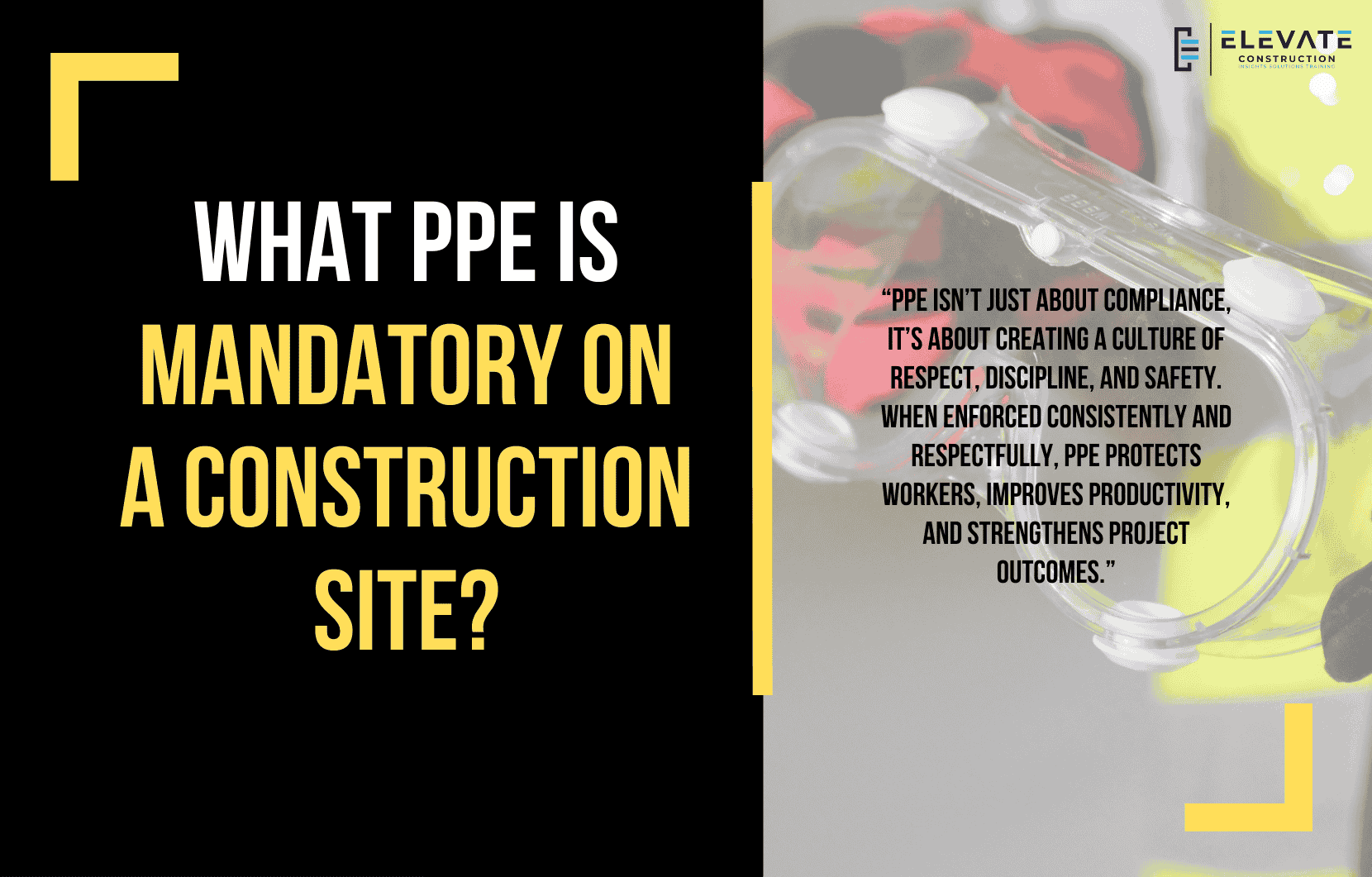What PPE Is Mandatory on a Job Site?
What PPE or personal protective equipment is and why is it mandatory on a job site? This is one of my favorite topics. I’m going to go all in on what’s required, why it’s important, and answer some of the most common questions we’ve been getting. If you’re interested in that, stay with us.
We’ve gathered six key questions around PPE that people often ask, and in this blog, I’m going to answer them one by one. This blog is for you, and we absolutely love creating this kind of content to help you succeed.
- What PPE is Legally Required on Most Job Sites?
Requirements vary depending on location, Mexico, the U.S., Canada, and Europe all differ. For this blog, I’ll use the United States as the base example.
OSHA-enforced rules and the safety culture in construction have dramatically reduced recordable incident rates by about 80% in recent decades. It’s working, and OSHA is making a massive impact on the safety and health of workers and project teams.
Here are the essentials most sites require in the U.S.:
- Work boots – not always steel-toe, but substantial boots are a must.
- Full-length pants and a shirt with four-inch sleeves (pants not always required in Canada).
- High-visibility clothing or vests, especially around heavy equipment.
- Hard hat anytime you’re outside the building or near overhead exposures.
- Glasses or goggles for eye protection as needed.
Most top general contractors take it further with additional requirements:
- Substantial leather boots past the ankle.
- Full-length pants and collared shirts (four-inch sleeves required).
- High-visibility vest.
- Hard hat (many now prefer modern helmet styles with chin straps).
- 100% Z87-rated eye protection.
- Gloves.
Some companies, like Hensel Phelps, have moved to 100% glove policies to eliminate hand injuries.
- Who is Responsible for Enforcing PPE Requirements?
The general contractor. Always.
If you truly respect your workforce, you enforce PPE without compromise. Sending someone home isn’t punishment, it’s respect. If someone refuses PPE, it’s a sign they won’t follow other critical safety measures like fall protection, which puts lives at risk.
On my projects, PPE is non-negotiable. Everyone wears their glasses, hard hat, vest, and gloves, or they don’t work there.
- How Do You Get Trades to Follow PPE Without Constant Conflict?
Punishment culture doesn’t work. Respect culture does.
- Send workers home out of respect, not punishment.
- Stop crews to clean up out of respect for the trade next to them.
- Provide clean bathrooms and do barbecues out of respect for the workforce.
- Morning huddles show respect by preparing people for the day.
Respect means not tolerating unsafe behavior. If someone is working without PPE, it’s because the superintendent allowed it.
- Can PPE Improve Productivity?
Yes, absolutely.
Think of the movie Patton. The Allied forces turned the tide of war when discipline, training, and standards were enforced. On construction sites, PPE works the same way.
When workers look like construction workers, act like construction workers, and gear up like construction workers, they are mentally ready to work at their best. PPE creates discipline, unity, and readiness.
- How Do You Handle Crews That Push Back on PPE?
They push back because they think they can. The solution? Be stubborn in a respectful way.
On my projects, PPE is not up for negotiation. Everyone on the delivery team is on the same page, and once crews realize there’s zero tolerance, they stop pushing. Whatever you tolerate on a project is what will happen.
- What’s the Right Way to Lead Complaints?
Some safety professionals argue against zero tolerance, but from real project experience, I can tell you: there’s no other way. Zero tolerance, rooted in respect, is the only standard that works.
Enforcement doesn’t have to be harsh, it can be sending people home with love, doing field walks with foremen, or holding consistent safety reviews. The key is consistency.
Your project’s success will always be determined by the worst behavior you are willing to tolerate. If you need motivation, go watch Patton, it will fire you up to lead with discipline and respect.
Key Takeaway
PPE isn’t just about compliance, it’s about creating a culture of respect, discipline, and safety. When enforced consistently and respectfully, PPE protects workers, improves productivity, and strengthens project outcomes.
If you want to learn more we have:
-Takt Virtual Training: (Click here)
-Check out our Youtube channel for more info: (Click here)
-Listen to the Elevate Construction podcast: (Click here)
-Check out our training programs and certifications: (Click here)
-The Takt Book: (Click here)
Discover Jason’s Expertise:
Meet Jason Schroeder, the driving force behind Elevate Construction IST. As the company’s owner and principal consultant, he’s dedicated to taking construction to new heights. With a wealth of industry experience, he’s crafted the Field Engineer Boot Camp and Superintendent Boot Camp – intensive training programs engineered to cultivate top-tier leaders capable of steering their teams towards success. Jason’s vision? To expand his training initiatives across the nation, empowering construction firms to soar to unprecedented levels of excellence.
On we go

